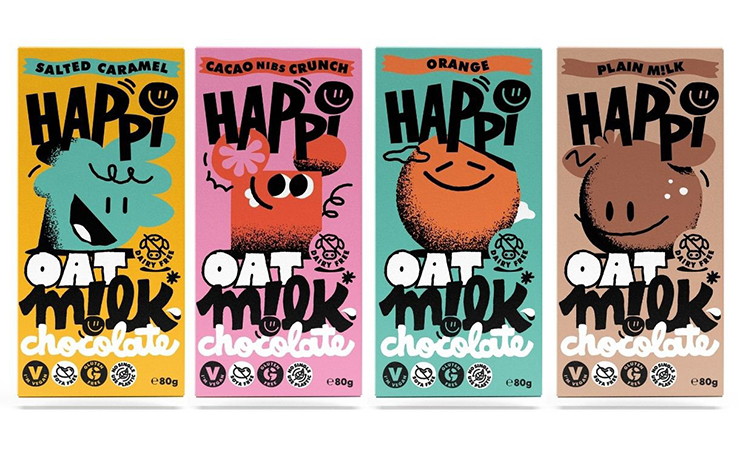Dr. Bronner’s of all-natural soap fame has launched a line of six plant-based chocolate bars. Surprised? You shouldn’t be. Excited? Yes, you should be.
Plant-based is the new buzzy catchphrase being applied to everything from burgers to, well, chocolate. Companies like Cadbury’s, Hershey’s, and even boutique companies are jumping on the bandwagon to appeal to a growing crowd of consumers with a sweet tooth.
Plant-based chocolate has become so in demand that its sales were up 11.7% for the year ending in mid-September, according to market research firm NielsenIQ, Chicago.
The plant-based trend is growing in the U.K. and the U.S., propelled partly by consumers’ desire to eat better. It’s also driven by a fervent wish to protect the environment since the United Nations cite cattle rearing as generating more greenhouse gas emissions than the entire transportation sector.

Ethical chocolate
I’ve tried Dr. Bronner’s All-One Magic chocolate and it’s good. But more than that, it does good. “When we learned that many of the 800 farmers who supply our Regenerative Organic Certified Serendipalm project in Ghana also grew cocoa, it was a perfect opportunity to grow our partnership with fair trade farmers by developing these cocoa beans,” said David Bronner, cosmic engagement officer for Dr. Bronner’s, in a statement.
And this is what today’s consumers are looking for: A mouthful of indulgence and a whole lot more of ethical chocolate.
Take Boulder, Colo.-based Chocolove, which bears the Rainforest Alliance seal, alongside logos from Fair Trade Certified, USDA Organic, Non-GMO Project Verified, Kosher Dairy, Roundtable on Sustainable Palm Oil, plus more.
“Plant-based adherents tend to be more focused on or concerned about fair trade, ethical business practices, social justice, worker welfare, etc.,” says Maeve Webster, president of foodservice consultancy Menu Matters, Arlington, Vt. But other consumers, she says, are also, “becoming increasingly concerned with these issues.”
In fact, a study Webster fielded showed that a large share of consumers -— particularly younger consumers — are expanding their definition of sustainability to include these other non-environmentally specific issues, which gives them a competitive edge.
Fair trade is one of many. “Chocolate is definitely a growth area for fair trade and we’ve seen a lot more brands sign-on,” says Mary Linnell-Simmons, a spokesperson for Fairtrade America in Washington, D.C. A survey Fairtrade America ran with GlobeScan this year showed awareness of fair trade products is up, and because of this, she says the average consumer is willing to pay 30% more for fair trade chocolate.
Big chocolate’s going vegan
Many small companies are making chocolate without animal products, such as Caroboo and Divine in the U.K. and Raaka and Evolved in the U.S. But the big chocolatiers are getting in on the action too.
- Cadbury’s, in October, launched a vegan version of its Dairy Milk in two flavors.
- Mars released dairy-free versions of its popular Bounty and Topic bars in the U.K.
- Galaxy has three vegan options for Brits.
- The great-great grandson of John Cadbury, James Cadbury, has launched an oat milk chocolate called Hip for English chocolate-eaters.
- Stateside, Hershey is testing Hershey’s Oat Made (made with oat milk), also in two varieties.
- Kit Kat’s V (for vegan) bars are available in countries including the U.K., Australia, and parts of Asia.
- And even upscale European company Lindt has launched Hello, a line of plant-based chocolate bars.

Happy with Happi
Happi is a Nottingham, U.K.-based company with a line of oat milk chocolates. The company donates to good causes, buys directly from farmers, and uses sustainable packaging. The brand offers bars, chocolate buttons, and even an advent calendar and selection box for the upcoming holiday season.

Sales are mainly through independent retailers like zero waste stores and ethical retailers. Founder Gavin Cox is finding it difficult to break into conventional retailers because “the market is so competitive.” However, he hopes to be on supermarket shelves in the first quarter of 2022.
He expects the plant-based chocolate trend to continue to grow, especially, he says, since the recent launch of Cadbury’s Plant Bar, at £2.50 (US$3.40) , “which will really help retailers and consumers understand the cost variance between plant-based chocolate and standard chocolate.”
As the prevalence of vegan diets grows and consumers become more aware of the ramifications of the food choices they make, we’re likely to see more plant-based chocolates on the market.
“People are always looking to feel better about the treats they enjoy,” says Webster. “If plant-based chocolates allow them to enjoy those treats without — or less of — the guilt, then all the better.”
Are you a buyer on RangeMe interested in finding plant-based chocolate? Browse options here.

